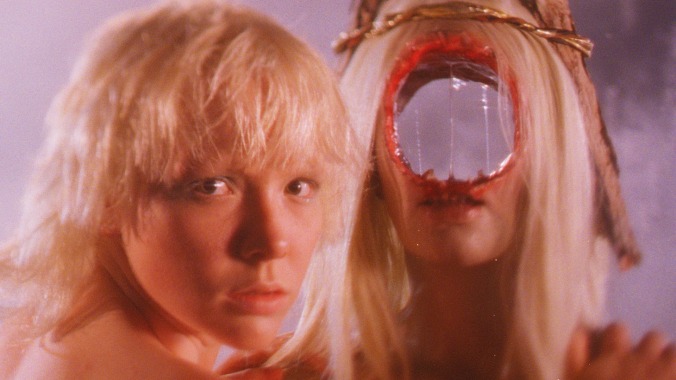After Blue (Dirty Paradise) dresses up a hero’s journey in dreamlike imagery
Bertrand Mandico's experimental tale of a woman's post-apocalyptic odyssey uses nostalgic pastiche to create a handmade arthouse adventure
Film Reviews Creative works
Nostalgic pastiche is a valuable exercise for a filmmaker wishing to recapture the emotion and aesthetic of a bygone period, something writer-director Bertrand Mandico understands well with his science-fiction experiment, After Blue (Dirty Paradise). Deliberately evocative of fantasy and science fiction of the 1970s, After Blue plays like a modern reincarnation of those films that were high on concept but either low on budget or ahead of their time in terms of technological capacity to realistically realize their vision on screen.
This aesthetic choice gives the film license for its own uncanny surrealism and impressive in-camera visual effects to mask its own modest budget, but it also feels an awful lot like that ethos is the sole thing upon with Mandico hinges his entire film, creating an experience that is as singular as it is inscrutable.
Set on the post-Earth colony planet from which the title takes its name, After Blue imagines a world where all men have died out, leaving only those with ovaries able to survive in a wasteland of strange flora and fauna. Roxy (Paula Luna), a young woman shunned by her peers for being strange, unwittingly releases the villainous Kate Bush—no, not that one—in exchange for three wishes. After that first wish is implicitly granted to murder Roxy’s teenage tormenters, Kate Bush (Agata Buzek) escapes, leaving Roxy to face the consequences from the village leaders. Her mother Zora (Elina Löwensohn), the local hairdresser in charge of managing the thick body hair that grows from women’s bodies on After Blue, is subsequently pressed into exile until she and Roxy can kill and claim the bounty on Kate Bush.
Playing something like portions of Suzy McKee Charnas’ Holdfast Chronicles filtered through a neon-saturated reinterpretation of Zardoz, After Blue develops into a bizarre take on the Western story template, with Zora and Roxy trekking across obviously crafted environments in a quest that might be called episodic—if its episodes were at all distinct or coherent. Mandico’s story plays with a lot of overlapping elements that don’t so much feel complementary as scattershot.
Roxy is intermittently in erotic psychic communication with Kate Bush, which is not to be mistaken for the voiceover narration in which she recounts her tale to an unknown interrogator. The spirits of her dead peers haunt her, albeit to little tangible effect. Zora struggles to cope with the necessity of surviving in the wilds, eventually finding solace in eccentric gunslinger (Vimala Pons) who takes them into her home. A male android (Michaël Erpelding) creates tentacular sexual tension and shoots a little metal ball from his green-lactating nipple.
Presented less as a series of vignettes than a kaleidoscopic collage of motifs that resemble the form and function of the archetypal hero’s journey, Mandico’s so-called Dirty Paradise is much more concerned with evoking an alien sense of place than portraying an easily digestible series of events. This serves the film’s sense of style, where the artificial sets and deep hues of rainbow lighting give way to overlapping images and cryptic dialogue that moves in and out of voiceover.
It’s never an incomprehensible story, but it certainly requires much more active attention than its simple overarching trajectory would imply, if only because characters often take massive motivational leaps that are either only elaborated upon in retrospect or rely on dialogue that is overly embellished when characters might otherwise speak plainly. (Granted, this may be a function of the subtitled translation of French to English, but it’s doubtful even native French speakers would find this a casual viewing experience.)
If this all sounds like a lot to process, at times, it is. After Blue (Dirty Paradise) is a singular stylistic vision, and it’s much less concerned with making sure you’re on the same page with its plotted machinations than in immersing you in its otherworldly glamour, in no small part assisted by an ethereal score by Pierre Desprats. And yes, with a runtime of over two hours, the persistent barrage can become exhausting, letting the novelty of its presentation wear thin as one becomes acclimated to the otherworldliness.
It’s a film that is functioning on a very specific artistic wavelength that requires one to buy into it completely in order to fully appreciate its delights. Whether that specific frequency is too obtuse for all but the most hardcore enthusiasts for ’70s sci-fi is up for debate, but the curious would best be served to experience this strange new world for themselves.